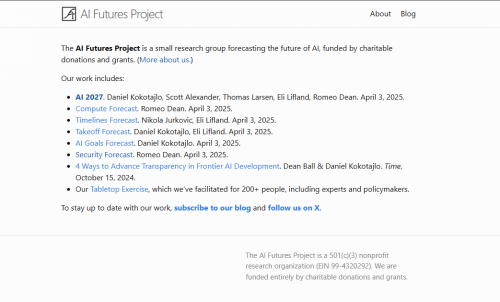The AI Futures Project is a 501(c)(3) nonprofit research organization (EIN 99-4320292). We are funded entirely by charitable donations and grants.
Contact
You can reach us at info@ai-futures.org or [firstname]@ai-futures.org. We look forward to hearing from you.
Team
Daniel Kokotajlo, Executive Director: Daniel oversees our research and policy recommendations. He previously worked as a governance researcher at OpenAI on scenario planning. When he left OpenAI, he called for better transparency of top AI companies. In 2021, he wrote What 2026 Looks Like, an AI scenario forecast for 2022–2026 that held up well. See also his Time100 AI 2024 profile.
Eli Lifland, Researcher: Eli works on scenario forecasting and specializes in forecasting AI capabilities. He also co-founded and advises Sage, which builds interactive AI explainers. He previously worked on Elicit, an AI-powered research assistant, and co-created TextAttack, a Python framework for adversarial examples in text. He ranks first on the RAND Forecasting Initiative all-time leaderboard.
Thomas Larsen, Researcher: Thomas works on scenario forecasting and focuses on understanding the goals and real-world impacts of AI agents. He previously founded the Center for AI Policy, an AI safety advocacy organization, and worked on AI safety research at the Machine Intelligence Research Institute.
Romeo Dean, Researcher: Romeo specializes in forecasting AI chip production and usage. He is completing a computer science master’s degree at Harvard University with a focus on security and hardware. He previously was an AI Policy Fellow at the Institute for AI Policy and Strategy.
Jonas Vollmer, COO: Jonas focuses on our communications and operations. Separately, he also helps manage Macroscopic Ventures, an AI venture fund and philanthropic foundation. He previously co-founded the Atlas Fellowship, a global talent program, and the Center on Long-Term Risk, an AI safety research non-profit.










